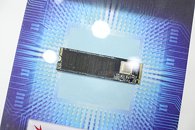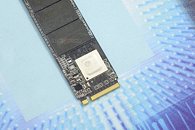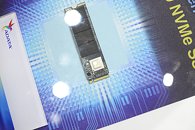- Joined
- Oct 9, 2007
- Messages
- 47,298 (7.53/day)
- Location
- Hyderabad, India
| System Name | RBMK-1000 |
|---|---|
| Processor | AMD Ryzen 7 5700G |
| Motherboard | ASUS ROG Strix B450-E Gaming |
| Cooling | DeepCool Gammax L240 V2 |
| Memory | 2x 8GB G.Skill Sniper X |
| Video Card(s) | Palit GeForce RTX 2080 SUPER GameRock |
| Storage | Western Digital Black NVMe 512GB |
| Display(s) | BenQ 1440p 60 Hz 27-inch |
| Case | Corsair Carbide 100R |
| Audio Device(s) | ASUS SupremeFX S1220A |
| Power Supply | Cooler Master MWE Gold 650W |
| Mouse | ASUS ROG Strix Impact |
| Keyboard | Gamdias Hermes E2 |
| Software | Windows 11 Pro |
It looks like SSDs will beat graphics cards to utilizing (and benefiting) from the bandwidth of PCI-Express gen 4.0 bus. AMD X570 platform motherboards offer 2-3 M.2 slots with PCIe gen 4.0 x4 wiring (64 Gbps). Corsair formally launched the MP600, and now ADATA joins the party with its unnamed drive. Based on the Silicon Motion SM2267 controller, the drive comes in an unbelievable capacity of up to 8 TB, probably using 96-layer QLC NAND flash.
The controller features DRAM cache, and dynamic SLC caching (all of the NAND flash is treated as SLC until storage demands force portions of them to be treated as MLC, TLC, and eventually QLC). It takes advantage of NVMe 1.3 protocol. As for performance, ADATA claims sequential speeds of up to 4000 MB/s reads. Such speeds were impossible of PCIe gen 3.0 x4 due to various overheads. Sequential writes are still up to 3000 MB/s. 4K random read/write access is rated at 400k IOPS. The company didn't reveal availability details.



View at TechPowerUp Main Site
The controller features DRAM cache, and dynamic SLC caching (all of the NAND flash is treated as SLC until storage demands force portions of them to be treated as MLC, TLC, and eventually QLC). It takes advantage of NVMe 1.3 protocol. As for performance, ADATA claims sequential speeds of up to 4000 MB/s reads. Such speeds were impossible of PCIe gen 3.0 x4 due to various overheads. Sequential writes are still up to 3000 MB/s. 4K random read/write access is rated at 400k IOPS. The company didn't reveal availability details.



View at TechPowerUp Main Site







